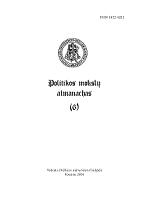Mobingo pasekmių modelis individualiajame ir organizacijos lygmenyse
MODEL OF MOBBING CONSEQUENCES ON INDIVIDUAL AND ORGANIZATIONAL LEVEL
Author(s): Jolita WeinhardSubject(s): Economy
Published by: Vytauto Didžiojo Universitetas
Keywords: mobingas; auka; pasekmės; individualusis lygmuo; organizacinis lygmuo; organizacijos klimatas; mobbing; mobbing as discrimination in employee relations; model of mobbing consequences; individual level; organizational level
Summary/Abstract: In practice we cannot talk about mobbing consequences on any level before the leaders of organizations and employees do not understand the damage of unconstructive conflicts and do not take personal responsibility for the organization and its members. Unfortunately even in scientific literature there are cases when, for example, the spreading of rumors and gossips are evaluated positively as a useful source of information. After the evaluation of the phenomenon's nature, mobbing consequences and the harm done, we can state that mostly it is noticed on the individual level. The consequences of mobbing have three sides that have close psychological, physical and professional connections. The consequences which can hardly be identified in the latent phase of the conflict are becoming more difficult and become more obvious when the conflict is escalated. Mobbing consequences are the ones that cause a long-lasting stress, which starts with sleeping disorders, irritation and progress into the pain of social isolation, psychosomatic disorders, the problems of the digestive, heart and blood systems, and affect the core brain function. Actually in Lithuania mobbing should be treated as discrimination and a painful torture as well, therefore should be ranked as a physical damage to a victim and be regulated by the state’s law. Very often the victims of mobbing become people who are more professional than others, but mobbing changes the roles of the conflict participants and the victim becomes the cause of the conflict, i.e. the one who brings damage to the organization. So this becomes the cause for the unreasonable sacking. To avoid this the leaders of organizations should understand the nature of mobbing phenomenon and the mechanism of its process. Mobbing tries to show the victims less professional and at the end the goal is reached. In other words, because of the destructive mobbing actions the victim destructs himself professionally. Work efficiency decreases, as well as the initiative and the devotion to the organization becomes weaker and the victim in his mind „sacks himself“ so that any activity becomes formal. The person, who has experienced mobbing can suffer sickness all his life. Nevertheless it is impossible to analyze the consequences of mobbing separately from the consequences which affect the organization. If the system is treated systematically it is obvious that damage done to one of its elements becomes the damage to the whole system. There are no exact data in Western and Lithuanian science about the financial and economical loss experienced by organizations because of mobbing. But the developed Western countries count loss in tens of billions dollars; it includes the income which they did not get and expenses which are related to the quality of products, personnel search and rotation , education, sickness rate, disability, court expenses an compensations. The victims of mobbing often are the professionals with a perspective to g
Journal: Organizacijų vadyba: sisteminiai tyrimai
- Issue Year: 2010
- Issue No: 53
- Page Range: 111-125
- Page Count: 15
- Language: Lithuanian

